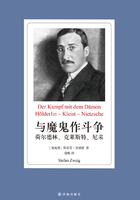Nelson's agitation had been extreme when he saw himself, before the action began, deprived of a fourth part of his ships of the line; but no sooner was he in battle, where his squadron was received with the fire of more than a thousand guns, than, as if that artillery, like music, had driven away all care and painful thoughts, his countenance brightened; and, as a bystander describes him, his conversation became joyous, animated, elevated, and delightful. The Commander-in-Chief meantime, near enough to the scene of action to know the unfavourable accidents which had so materially weakened Nelson, and yet too distant to know the real state of the contending parties, suffered the most dreadful anxiety. To get to his assistance was impossible; both wind and current were against him. Fear for the event, in such circumstances, would naturally preponderate in the bravest mind; and at one o'clock, perceiving that, after three hours' endurance, the enemy's fire was unslackened, he began to despair of success. "I will make the signal of recall," said he to his captain, "for Nelson's sake. If he is in a condition to continue the action successfully, he will disregard it; if he is not, it will be an excuse for his retreat, and no blame can be imputed to him." Captain Domett urged him at least to delay the signal till he could communicate with Nelson; but in Sir Hyde's opinion the danger was too pressing for delay. "The fire," he said,"was too hot for Nelson to oppose; a retreat he thought must be made; he was aware of the consequences to his own personal reputation, but it would be cowardly in him to leave Nelson to bear the whole shame of the failure, if shame it should be deemed." Under, a mistaken judgment, therefore, but with this disinterested and generous feeling, he made the signal for retreat.
Nelson was at this time, in all the excitement of action, pacing the quarter-deck. A shot through the mainmast knocked the splinters about;and he observed to one of his officers with a smile, "It is warm work, and this day may be the last to any of us at a moment:"--and then stopping short at the gangway, added, with emotion--"But mark you! Iwould not be elsewhere for thousands." About this time the signal-lieutenant called out that number Thirty-nine (the signal for discontinuing the action) was thrown out by the Commander-in-Chief. He continued to walk the deck, and appeared to take no notice of it. The signal officer met him at the next turn, and asked if he should repeat it. "No," he replied, "acknowledge it." Presently he called after him to know if the signal for close action was still hoisted; and being answered in the affirmative, said, "Mind you keep it so." He now paced the deck, moving the stump of his lost arm in a manner which always indicated great emotion. "Do you know," said he to Mr. Ferguson, "what is shown on board the Commander-in-Chief? Number Thirty-nine!" Mr. Ferguson asked what that meant. "Why, to leave off action!" Then shrugging up his shoulders, he repeated the words--"Leave off action?
Now, damn me if I do! You know, Foley," turning to the captain, "I have only one eye,--I have a right to be blind sometimes:" and then putting the glass to his blind eye, in that mood of mind which sports with bitterness, he exclaimed, "I really do not see the signal!"Presently he exclaimed, "Damn the signal! Keep mine for closer battle flying! That's the way I answer signals! Nail mine to the mast!" Admiral Graves, who was so situated that he could not discern what was done on board the ELEPHANT, disobeyed Sir Hyde's signal in like manner; whether by fortunate mistake, or by a like brave intention, has not been made known. The other ships of the line, looking only to Nelson, continued the action. The signal, however, saved Riou's little squadron, but did not save its heroic leader. This squadron, which was nearest the Commander-in-Chief, obeyed and hauled off. It had suffered severely in its most unequal contest. For a long time the AMAZON had been firing, enveloped in smoke, when Riou desired his men to stand fast, and let the smoke clear off, that they might see what they were about. A fatal order--for the Danes then got clear sight of her from the batteries, and pointed their guns with such tremendous effect that nothing but the signal for retreat saved this frigate from destruction. "What will Nelson think of us?" was Riou's mournful exclamation when he unwillingly drew off. He had been wounded in the head by a splinter, and was sitting on a gun, encouraging his men, when, just as the AMAZON showed her stern to the Trekroner battery, his clerk was killed by his side; and another shot swept away several marines who were hauling in the main-brace.
"Come, then, my boys!" cried Riou; "let us die all together!" The words had scarcely been uttered before a raking shot cut him in two. Except it had been Nelson himself, the British navy could not have suffered a severer loss.














